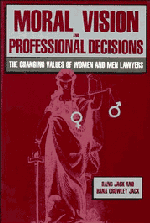Book contents
- Frontmatter
- Contents
- Preface
- Acknowledgments
- 1 Care and rights: two ways of perceiving the world
- 2 The lawyer's role: partisanship, neutrality, and moral distance
- 3 Personal morality: the orientation of lawyers toward rights and care
- 4 Personal morality and attorney role: changing perceptions of professional obligation
- 5 Women lawyers: archetype and alternatives
- 6 Toward a more morally responsive advocate
- Appendix I Coding Manual
- Appendix II Figures and tables
- Notes
- Bibliography
- Index
4 - Personal morality and attorney role: changing perceptions of professional obligation
Published online by Cambridge University Press: 16 September 2009
- Frontmatter
- Contents
- Preface
- Acknowledgments
- 1 Care and rights: two ways of perceiving the world
- 2 The lawyer's role: partisanship, neutrality, and moral distance
- 3 Personal morality: the orientation of lawyers toward rights and care
- 4 Personal morality and attorney role: changing perceptions of professional obligation
- 5 Women lawyers: archetype and alternatives
- 6 Toward a more morally responsive advocate
- Appendix I Coding Manual
- Appendix II Figures and tables
- Notes
- Bibliography
- Index
Summary
According to conventional wisdom, full adherence to the lawyer's role is mandatory for the legal system and for attorneys. Proper functioning of the system presupposes lawyers who fill their roles according to the letter of the law. Likewise, if lawyers expect professional success, they will abide by the rules that govern professional conduct. Rules of the role are carefully defined and powerfully communicated in law school, in the code of professional conduct, and in the daily practice of law. These rules specify correct action, duties and responsibilities, normative values, and the proper way to relate to others involved in the system, especially clients.
Moral terrain: a spectrum of responses
In our everyday lives most of us develop a pattern of responses and assumptions for dealing with moral questions and social reality. Like seedlings, these patterns often grow unnoticed, sprouting from family, friends, church, school, and chance events in our lives. Except for philosophers and theologians, few try to discover the roots of these responses and assumptions or, for that matter, even to articulate the patterns themselves. Rather, the patterns emerge with the rest of our personality and become simply a part of who we are.
What is right conduct? What is truth? How much proof is required before something is accepted as true? How do we react to hierarchy and authority? How do we solve problems? How do we respond to people in need? What is the nature of commitment? What does it mean to stand up for something we believe in? What do we mean by equality? By fairness? How do we measure success? Even if the questions and answers are never formally conceptualized, each of us works out responses in order to thread our way through life.
- Type
- Chapter
- Information
- Moral Vision and Professional DecisionsThe Changing Values of Women and Men Lawyers, pp. 95 - 129Publisher: Cambridge University PressPrint publication year: 1989



